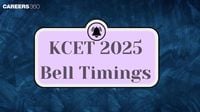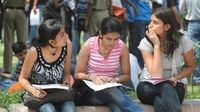The Karnataka Common Entrance Test (KCET) 2025 commenced on April 16, 2025, with the Physics and Chemistry exams, marking a significant milestone for students aspiring to enter various undergraduate programs in Karnataka. Organized by the Karnataka Examinations Authority (KEA), this pen-and-paper examination serves as a gateway for admission into engineering, pharmacy, agriculture, and other professional courses. The first day of the exam saw students tackle the Physics paper from 10:30 AM to 11:50 AM, followed by Chemistry from 2:30 PM to 3:50 PM.
The KCET exam is structured to test students' knowledge through multiple-choice questions, with each paper consisting of 60 questions that must be completed within 80 minutes. The examination schedule is designed to ensure that candidates have adequate time to prepare and perform their best. On April 17, students will face the Mathematics and Biology papers, continuing the rigorous assessment process.
Students are encouraged to arrive at their respective examination centers at least 45 minutes prior to the start time, armed with their KCET 2025 admit card and a valid photo ID. The KEA has also issued guidelines to enhance the examination experience, including prohibiting electronic devices and ensuring adherence to a dress code to facilitate smooth entry and security checks.
As part of the examination's integrity measures, the KEA has employed AI-powered facial recognition technology for the first time. This initiative aims to curb impersonation and streamline the entry process, reflecting a move towards modernizing examination protocols. Candidates have reported a generally positive experience with the new technology, highlighting its efficiency compared to traditional methods. However, some minor issues, such as photo errors on admit cards, have been noted but were resolved swiftly by officials.
Student feedback from the Physics examination indicates a moderate difficulty level, with many finding the paper lengthy due to the number of formula-based questions. "The questions were directly from the NCERT textbook, but the paper was time-consuming," one student remarked. The overall sentiment suggests that those who were well-prepared could manage to attempt around 40 to 45 questions successfully.
The KCET 2025 exam is not just a test of knowledge but also a reflection of the students' hard work and preparation over the years. With a total of 2.6 lakh students expected to participate across 775 centers statewide, the stakes are high. The examination's structure and the introduction of advanced technology represent the KEA's commitment to providing a fair and efficient testing environment.
As the results are anticipated to be released in May 2025, students are advised to regularly check the official KEA website for updates regarding the provisional answer keys and the final results. The KEA is expected to allow candidates to raise objections regarding the answer keys within a specified timeframe, ensuring transparency in the evaluation process.
In addition to the rigorous examination process, the KCET also plays a crucial role in determining cutoff ranks for various courses, particularly for students from the Other Backward Classes (OBC). Candidates in this category must secure at least 40% in the KCET exam to qualify for counseling and seat allocation. Historical data suggests that the cutoff ranks for popular branches like Computer Science Engineering and Electronics and Communication Engineering typically range between 15,000 to 25,000.
For the OBC category, previous trends indicate that the expected cutoff ranks for courses such as Artificial Intelligence and Mechanical Engineering may vary significantly. For example, last year's estimated cutoff for Artificial Intelligence was around 4,258 ranks, while Mechanical Engineering was approximately 32,386 ranks. These figures underscore the competitive nature of the KCET and the importance of aiming for a higher score to secure admission into desired programs.
As the KCET 2025 progresses, it serves as a reminder of the challenges and opportunities that lie ahead for students in Karnataka. The examination not only tests academic knowledge but also prepares students for the rigors of their future educational paths. With the introduction of cutting-edge technology and stringent examination protocols, the KEA is setting a precedent for future assessments, ensuring that every candidate has a fair chance at success.
In summary, the KCET 2025 is more than just an examination; it is a pivotal moment for students aspiring to further their education and careers in various fields. As they navigate this critical juncture, the support from educators, parents, and the community will undoubtedly play a vital role in their journey towards achieving their academic goals.








